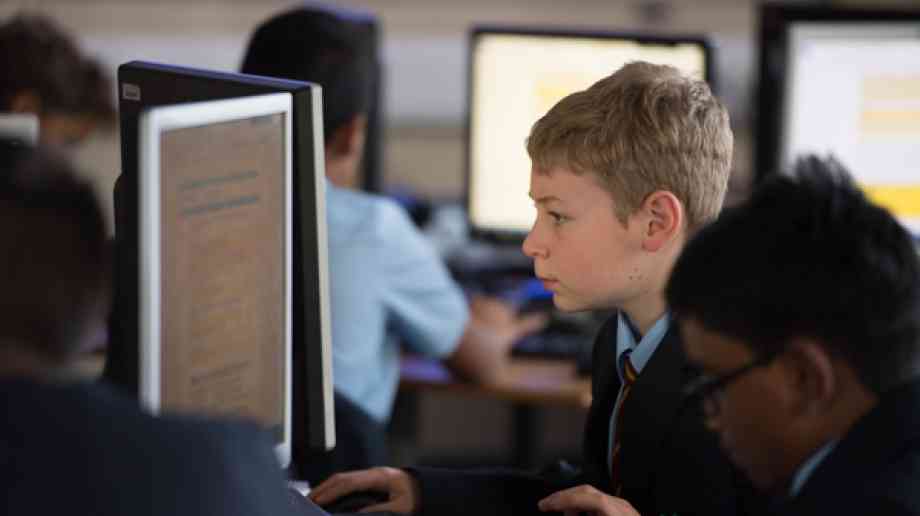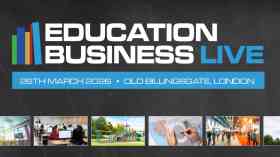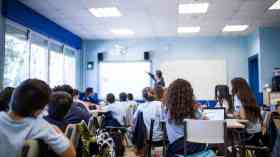
Inspiring a love of Computer Science
At Dartford Grammar School in Kent, half of students take GCSE Computer Science and it’s one of the most popular choices for university applications. And now it’s sharing that inspiration and expertise to drive up Computer Science standards across the region.
Dartford Grammar is one of a network of 34 Computing Hub schools established by the National Centre for Computing Education (NCCE) across England to deliver computer science training to teachers and support to primary and secondary schools.
Established as one of the NCCE’s first hubs in July 2019, Dartford Grammar started delivering its courses in January and, of course, had to quickly adapt its provision to cope with the impact of the coronavirus pandemic.
“We had to pivot quickly,” said teacher Steve Ireland, who leads the Computing Hub at the school. “But we were well placed to do that and to deliver CPD online. Digital skills and technology have been at the heart of what we do and, in many ways, the coronavirus pandemic has highlighted the need for these skills across so many sectors.”
Since January, 150 teachers have attended the Computer Science Accelerator (CSA) course at Dartford, the NCCE’s course to develop GCSE subject knowledge for non-specialist teachers. Support continued through the school summer break, significantly contributing to the 1,300 teachers who have come to the CSA across England, and the further 2,300 enrolled on the programme.
“It’s been incredibly busy through the lockdown period and, since the start of term, the focus has on a blended learning approach,” said Steve.
Darford’s expertise and enthusiasm was recognised when Schools Minister Nick Gibb visited the school in September. “What is so wonderful about this school is its ambition; its ambition for the students, ambition for the curriculum, and ambition for taking part in Hub programmes - it is a centre of excellence that can spread out to other schools,” Mr Gibb told staff and students.
A whole school approach to Computer Science
Dartford takes a whole school approach to Computer Science, which has been maintained through lockdown period, when Dartford also supported home teaching, supported with live Q&A sessions CS teachers.
“In our KS3, middle years, we put the focus on projects with a lot of work on design, development and testing. We clearly have some success in building enthusiasm, as around half our students take CS GCSE,” said Steve.
“We have three GCSE classes, of 30 students. And this year’s Y12 CS has 54 students, up on 35 the previous year.”
As a school it works closely with primary and secondary and while many schools emphasise coding, Dartford’s Computing Hub encourages a broad approach.
“Coding is vital, but we also look at a broader curriculum, delivering the national computing curriculum, but also looking at IT and digital literacy. It’s about being really varied and offering diversity,” said Steve.
The school offers the International Baccalaureate (IB) rather than A levels, allowing students to study a broader range of subjects, including computer science.
As part of the IB Diploma programme, students’ project work involves working with clients to address a real-world problem.
“Over recent years we have seen several applications that demonstrate ingenuity and appropriateness, “ said Steve.
“One student created an application for a cribbage club for members who could only meet once a week, but wished to play more often. A program was created to allow the members to play separately between meet-ups. The proposed program idea allowed the club members to play cribbage against somebody using pre-programmed strategy instead of needing another person, which enabled members to get extra practice between games.
“Our Year 9 students also worked on designing an app, and explored concepts of family, loss, bullying and identity. They had to design, develop and test a mobile application, with many students using characters from the Lion King to explore these issues. The target audience for these apps were KS2 students.”
Dartford’s work as a Computing Hub aims to increase the number and attainment of pupils studying computer science and A level as well as teacher confidence in teaching the computing curriculum.
There’s also a real drive to increase take-up of computer science amongst girls and in disadvantaged areas, improving the diversity of all young people studying computing. It’s clearly delivering results.
“In every year group around 10 percent of our students choose to apply to university to study Computer Science. We’ve had up to 37 students in a year group looking to study Computer Science at university, and we’re delighted to send one of our girls to Cambridge University to study CS this year,” said Steve.
“We know how valuable Computer Science will be to young people’s future, and the wider economy and we’re on track to make sure our students and those beyond our school, have the best possible start to their computer science journey.”
Headmaster of Darford Grammar School John Oakes, commented: “Whenever front line educational professionals are given the opportunity to work together, schools and young people benefit. We are delighted to play our part in this exciting area of the curriculum and promote these increasingly important life skills as we move towards new ways of working.”
Isabel Bajomo, a Y12 student at Dartford Grammar, explained why she’d chosen to study computer science: “Computer Science is relevant to the world, It’s an amazing and interesting subject that causes me to be more conscious of the world around me and where the future is heading. Plus, composing an algorithm, implementing and seeing your own creation function is extremely rewarding.”
Explaining why she chose to study at DGS, Isabel said: “I believe I will be pushed and challenged at length and the emphasis on the content will be very efficient. Also, in the open evening, the student I spoke with sounded very passionate about the teaching and consideration put into this computer science journey at school.”
Latest News
14/11/2025 - 11:04
England’s councils are warning of a "ticking time bomb" in the special educational needs and disabilities (SEND) system, with new data showing deficits that could bankrupt local authorities within three years.
13/11/2025 - 12:14
Event for school leaders, governors and education professionals relocates to the historic Old Billingsgate venue in London.
13/11/2025 - 09:49
The regulations have been set following a second consultation and detailed collaborative working with organisations and people across deaf and hearing communities.
13/11/2025 - 09:39
The Education Committee has published a letter to the Secretary of State for Education asking for more detail about the Department for Education’s work on developing its SEND reforms.
13/11/2025 - 09:26
New analysis by NFER has highlighted the uneven distribution of pupils with special educational needs and disabilities (SEND) across mainstream schools in England.







